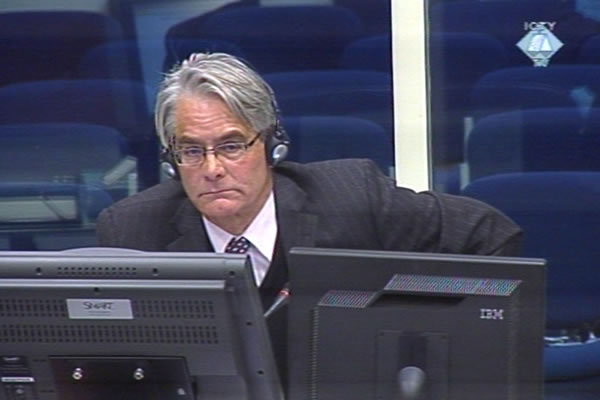Home
GENERAL SMITH: NOTHING PERSONAL IN STRIKES AGAINST MLADIC
In the cross-examination, Ratko Mladic’s defense counsel attempted to portray British general Rupert Smith as a person who had come to BH with the intent to ‘fight against Serbs’. According to the defense, the air strikes against the VRS positions were ‘personal, a showdown’ between Smith and Mladic. The witness responded that there was nothing personal there. The only goal was to force Mladic to stop the attacks on Sarajevo and other safe havens
 Rupert Smith, witness at the Ratko Mladic trial
Rupert Smith, witness at the Ratko Mladic trial In the cross-examination of British general Rupert Smith, Ratko Mladic’s defense suggested that Smith, who was the UNPROFOR commander in BH at the time, was ‘under pressure’ when he decided to call in air strikes on Serb positions in late August and early September 1995, immediately after the second Markale incident.
General Smith replied that in a telephone conversation with Mladic immediately after the incident he did say he was ‘under pressure’, in an effort to show Mladic that the situation was serious, since at the time, Smith had been contacted by various people from the UN and NATO HQ and the representatives of the Bosnian authorities. They all wanted to find out what he intended to do.
Mladic’s defense counsel Dragan Ivetic put it to General Smith that he had come to BH to ‘fight against Serbs’. The air strikes on the Serb positions were ‘personal, a showdown’ between Smith and Mladic, the defense counsel implied. The witness dismissed the allegation. ‘It was personal only insofar as I tried to force Mladic to change his attitude’, General Smith said.
The witness confirmed that another goal of the strikes was to weaken ‘Mladic’s position as a commander’. Military targets in the village where Mladic’s parents were buried were attacked to ‘humiliate’ Mladic and show him he was unable to defend ‘the remains of his predecessors’. ‘So what if he was humiliated, all he had to do was stop the attacks on the safe havens’, Smith insisted.
Defense counsel Ivetic then brought up a letter General Mladic sent to General Bernard Janvier on 4 September 1995, protesting against the strikes on Serb positions, complaining that Smith rejected his proposal to establish a joint commission to investigate the Markale incident and that Smith prevented the disclosure of the details of UNPROFOR’s final report.
Smith was then asked if it was true that he banned the publication of the report because he didn’t want his decision on air strikes to be reviewed. ‘No. I was convinced that my decision was right and I still believe that it was right’.
At the end of the witness’s evidence, presiding judge Orie noted that General Rupert Smith could possibly be recalled to The Hague to provide some more answers. The trial continues tomorrow with the evidence of a new prosecution witness.
